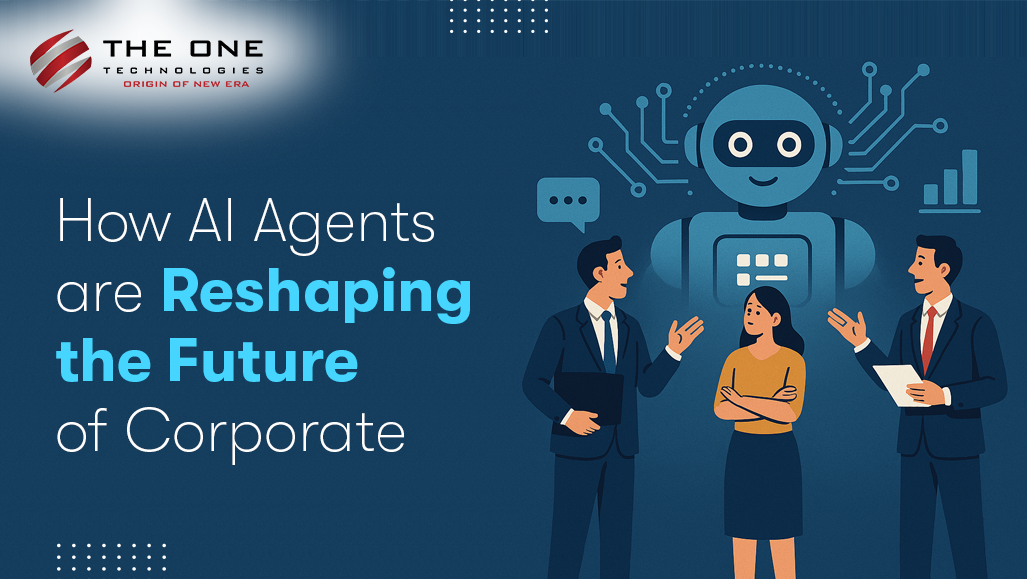How AI Agents Are Reshaping the Future of Corporate

AI agents are transforming daily life, professional environments, and teamwork. These advanced systems are reshaping entire sectors by handling routine processes and boosting efficiency like never before. Whether it’s simplifying operations or enabling instant, insight-backed choices, AI agents are more than just assistants—they’re pivotal forces redefining the future of work. Discover how these breakthroughs are setting new standards across industries.
By automating monotonous duties, refining workflows, and freeing up human talent for higher-level thinking, AI agents amplify what people can achieve. They’re not mere software—they’re dynamic collaborators, influencing everything from individual responsibilities to corporate strategies and operational models.
Table of Content
- How AI Agents Work
- How AI Agents Are Built
- Can AI Agents be Monetized?
- How AI Agents Will Replace SaaS
- How AI Agents Are Changing Software Development
- AI Agents for Marketing
- Conclusion
How AI Agents Work
AI agents operate by utilizing machine learning, natural language processing, and data analysis to perform tasks traditionally handled by humans.
- Data Processing: AI agents process huge amounts of data in real-time, enabling them to make informed decisions based on patterns and trends.
- Automation: They automate repetitive tasks, minimize the need for manual input and improve operational efficiency.
- Machine Learning: AI agents continuously learn and improve their performance over time, adapting to new information and tasks.
- Collaboration: AI agents work alongside human employees, enhancing decision-making, providing insights, and assisting in complex problem-solving.
Through these mechanisms, AI agents are able to perform a wide variety of tasks, from answering customer queries to managing complex workflows.
How AI Agents Are Built
Building AI agents involves several key technologies and processes that make them capable of functioning effectively in the workplace.
- Natural Language Processing (NLP): NLP enables AI agents to understand and interpret human language, making communication more seamless and efficient.
- Machine Learning Models: These models help AI agents learn from data and improve their abilities to handle tasks autonomously.
- Data Integration: AI agents pull data from various sources, ensuring they can provide real-time insights and solutions.
- User Interface Design: A user-friendly interface ensures that AI agents are easy to interact with, making them accessible to non-technical users.
- Security Protocols: AI agents are built with strong security measures to protect sensitive information and ensure privacy compliance.
These components work together to create AI agents that can serve multiple functions in any organization.
Can AI Agents be Monetized?
AI agents are not just valuable tools for productivity but can also create new revenue streams for businesses. By automating processes and providing smarter insights, AI agents are helping companies reduce costs and increase profitability.
- Automating Sales: AI agents can handle sales processes, from lead generation to closing deals, driving more revenue with less human intervention.
- Customer Service: By providing 24/7 customer support, AI agents can enhance customer satisfaction, increasing retention and sales.
- Data Analytics: AI agents analyze data to uncover new business opportunities, driving informed decision-making that leads to greater profitability.
- Marketing Automation: With AI-driven marketing, businesses can optimize campaigns to maximize returns, reaching the right audience at the right time.
These capabilities enable businesses to boost efficiency and grow their revenue streams through AI-powered automation.
How AI Agents Will Replace SaaS
The rise of AI agents is starting to challenge traditional SaaS models.
- Autonomous Decision Making: AI agents can make decisions without the need for manual input, removing the need for SaaS applications that require ongoing human management.
- Personalization: Unlike traditional SaaS, AI agents can be tailored to the specific needs of users, providing a more customized and adaptive solution.
- Cost Efficiency: AI agents reduce the reliance on multiple SaaS tools by consolidating functions like data analysis, communication, and automation into a single platform.
- Continuous Improvement: AI agents improve over time, meaning they get smarter and more efficient, while SaaS applications often require manual updates and intervention.
This shift towards AI agents could lead to a decline in the use of traditional SaaS tools, as businesses embrace smarter, more efficient alternatives.
How AI Agents Are Changing Software Development
AI agents are making a significant impact on the software development process.
- Code Generation: AI can assist in generating code, reducing the time and effort required for software development.
- Bug Detection: AI agents can identify errors in code faster and more accurately than human developers, improving software quality.
- Automated Testing: AI-driven testing tools can automatically test software, ensuring it works correctly before it’s released.
- Predictive Analytics: AI agents can predict software performance issues before they occur, allowing for proactive fixes.
With these capabilities, AI agents are accelerating the development cycle and ensuring better software outcomes.
AI Agents for Marketing
AI agents are changing the marketing landscape by offering innovative ways to connect with customers and optimize campaigns.
- Audience Segmentation: AI agents analyze customer data to segment audiences more effectively, ensuring tailored marketing strategies.
- Content Creation: AI-driven tools can create engaging content, from blog posts to social media updates, enhancing content marketing efforts.
- Ad Optimization: AI agents continuously optimize ad campaigns based on real-time performance data, maximizing ROI.
- Personalized Marketing: By analyzing customer behavior, AI agents create highly personalized marketing experiences that improve engagement and conversions.
These AI-powered strategies are helping businesses reach the right customers with the right message, driving more impactful marketing campaigns.
Conclusion
AI agents are transforming the way we work, automate processes, and drive innovation. From reshaping business operations to enhancing software development and marketing strategies, AI agents are offering unprecedented opportunities for growth and efficiency. As businesses continue to adopt AI-driven solutions, the future of corporate will increasingly be shaped by these intelligent AI agents, unlocking new potential across industries.



_638792726368647296.png)
_638792726380203508.png)





